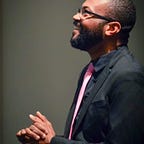No Right Side of Wrong
Staff from First Unitarian Church of Portland were asked to write a weekly reflection during this time. Here’s one from me, published on March 1, 2021.
The senior staff (the ministers, administrator, and directors) at the church meet together every week to get on the same page about the overall ministry of the congregation. Each week, before diving in, we pause to check in with each other. In one of our check-ins in recent weeks, I shared that, lately, I’ve been holding the tension between what it would mean to live and act according to best practices for establishing and maintaining a life of security and what it would mean to live according to the integrity of my best ideals. While I don’t believe I have become completely consumed by this, it is certainly on my mind constantly.
This tension changes faces every few hours, really, depending on what’s going on.
It can be seemingly small. For example, the other day, I was blessed enough with the opportunity to visit the post office. Right before I was to go in, someone else began coming out. This person seemed to me to be both elderly and disabled and struggled to navigate the door, the things they were carrying, the walker, and orienting themself toward the ramp. It was a lot. Yes, they had a face mask, and yes, it was technically on their face, but it was clearly not serving them or anyone else at that particular time. Before the pandemic, my response would have obviously been to immediately violate this person’s 6-foot bubble in order to help them. And, that is ultimately what I did, but it took me a good 3 seconds to weigh the risks and negotiate a response. I was (properly, I think) wearing a mask, and the encounter was so brief that I don’t believe there was any additional risk of exposure, but I hate that I had to think about it. This happens all the time.
The tension can be bigger. For example, a few weeks ago, I learned of a friend struggling financially. He’s a freelance musician, also Black, and living in an expensive city. Financial life is never easy for him, but the pandemic has exacerbated circumstances. I am a millennial and have worked as a musician pretty much my entire career. I am able to live comfortably enough today, but when it comes time to retire, there will almost certainly be not nearly enough to live on for any duration of time. This is true for most millennials and most musicians. Some of us are both. All of that said, I have sufficient immediate financial security. I will eat, I will be sheltered, I will be warm, I will be clothed, and I will even be able to purchase some non-necessity or other that brings me joy. The integrity of my best ideals says that I should give him some money. He needs it now. I won’t need it until 3 or 4 decades from now. However, best practices might say that all extra money should go toward saving for retirement or some emergency until those funds are secured. Obviously, I sent him the money, but I hate that I had to think about it. This happens all the time.
The tension can be bigger still. It can be about gentrification and people living below their means, pushing others deeper and deeper into poverty and out of their neighborhoods. It can be about capitalism and avoiding paying people just and generous salaries, allowing some to live liberally — and I’m not just talking about billionaires, I’m talking about many of us everyday, normal-sized, middle-class wealthy people. It can be about racism and why we are so devoted to the police state. It can be about misogyny and transphobia. It can be about disability. It can be about xenophobia. It can be about literally any social ill that is kept alive by the complacent comfort of the majority.
I’ve come to learn in these most recent weeks that every decision that I make that is even remotely connected to someone else matters. Wherever I am seen, whatever I say, however I spend money, whatever I post on the internet, whoever I love, whatever I wear, all of it. It all has the power to either feed the inertia of injustice or help to redirect the path toward love. Whatever choices I make will play a part in building the house we live in. I don’t mean this in a grandiose or self-important way. I mean it in a way that makes clear to me that I can take responsibility. I can live a life of intention, according to my ideals, and make some tiny difference that will be a part of the whole.
What can you do?
I have been finding increasing inspiration from the song, “The House We Live In” by Arlissa. Take a listen to it…
